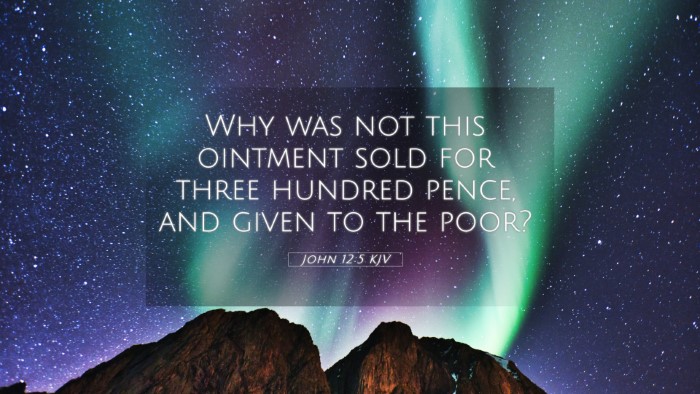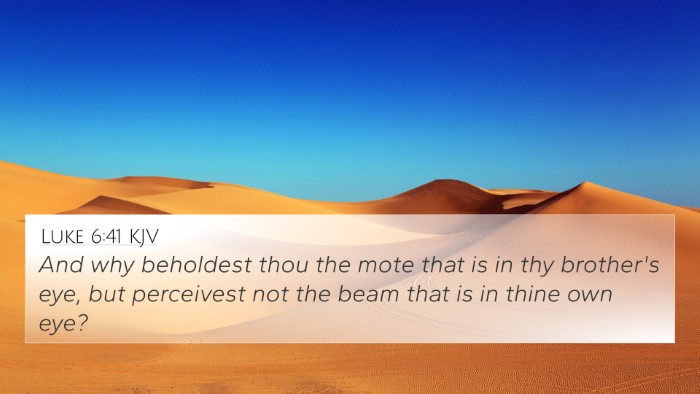Understanding John 12:5
Verse: "Why was not this ointment sold for three hundred pence, and given to the poor?" - John 12:5
This inquiry by Judas Iscariot raises significant topics regarding the nature of sacrifice, priorities in the Christian life, and the dichotomy between apparent piety and ulterior motives. The verse reveals Judas’s concern not for the poor but for the money itself, showcasing a deeper commentary on his character.
Contextual Background
Before delving into the specifics of John 12:5, it is essential to understand the context surrounding this event. This incident occurs shortly before the Passover, a time of heightened tension leading to the crucifixion of Jesus. In this narrative, Mary of Bethany anoints Jesus with expensive ointment, provoking Judas's critique. This act of devotion stands in stark contrast to Judas's insensitivity and greed.
Verse Analysis
Judas's statement reflects a common tension in Christian teaching: the call to care for the needy versus the worship and recognition of Christ. The cost of the ointment—300 pence, a substantial sum—raises questions about stewardship and intention.
Insights from Commentators
- Matthew Henry: Emphasizes the importance of sincerity in worship. He notes that Judas's concerns were not aligned with the heart of Christ's message. While the poor deserve attention, we must also give due honor to Christ, who is above all.
- Albert Barnes: Points out the hypocrisy in Judas's statement. He recognizes that although caring for the poor is virtuous, Judas himself was not genuine in his concern. This hypocrisy serves as a warning against those who may exploit piety for personal gain.
- Adam Clarke: Discusses the value of the ointment and reflects on the nature of true sacrifice. He suggests that the extravagance shown by Mary in anointing Jesus indicates the immeasurable worth of Christ and should inspire believers to prioritize their devotion to Him over worldly concerns.
Bible Cross-References
This verse connects to a variety of other scriptural insights, illustrating broader themes within the Bible. Here are some relevant cross-references:
- Matthew 26:8-9: Similar scene where disciples rebuke the woman for her extravagance.
- Mark 14:4-5: Additional account of the anointing, underscoring the theme of misplaced priorities.
- John 13:29: Foreshadowing Judas’s betrayal and his obsession with money.
- Matthew 19:21: Jesus calls for radical generosity, challenging attachments to wealth.
- Luke 12:33-34: Encouragement to give to the poor, focusing on heavenly treasures over earthly riches.
- James 2:15-17: Addresses faith without works, highlighting the imperative to care for the needy.
- 1 Timothy 6:10: Discusses the love of money as the root of all evil, echoing the themes in John 12:5.
Thematic Connections
The themes present in John 12:5 can be expanded through thematic Bible verse connections:
- The Cost of Discipleship: Luke 14:27-33 emphasizes the sacrifices involved in following Christ.
- The Value of Worship: Romans 12:1 calls believers to present their bodies as living sacrifices.
- The Pursuit of True Wealth: Matthew 6:19-21 teaches about treasures in heaven versus earthly possessions.
Conclusion: The Call for Reflective Faith
This poignant moment in John 12:5 serves as a reminder of the sincerity and integrity that should characterize our worship and service. As we cross-reference this verse with others, we see the invitation to examine our motives—is our devotion to Christ genuine, or do worldly attachments cloud our faith? Reflecting on these inter-Biblical dialogues can deepen our understanding of both the text and the underlying principles of Christian living.
Tools for Deeper Study
To explore more about the connections in the Bible, consider using:
- Bible concordances for quick cross-referencing
- Cross-reference guides for expanded thematic studies
- Comprehensive Bible reference resources to navigate interplay between scriptures
Engaging in a comparative study of scripture facilitates a richer comprehension of Biblical truths and enhances one’s faith journey.













